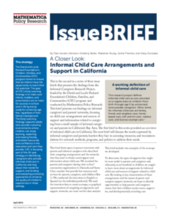This brief from Mathematica Policy Research presents findings from the Informal Caregivers Research Project on informal caregivers’ and parents’ networks in the US. The research focuses on child care arrangements and sources of support and information related to caregiving. Findings are based on a study of a small sample of informal caregivers and parents in California’s Bay Area. The research team sought to learn more about arrangements for informal child care and sources of support for informal caregivers to identify the types of supports that might be most useful to parents, caregivers and children.
The study found that: most children in informal care are infants and toddlers, parents and caregivers’ caregiving arrangements include family and friends, parents and caregivers rely on each other for support and information, most caregivers are unaware of child care subsidies that may be available to them, and parents and caregivers rarely cite institutions as sources of support for child care. This brief recommends that outreach efforts and interventions aimed at children and caregivers in informal care arrangements take these findings into consideration when designing and implementing programs.

